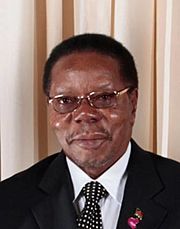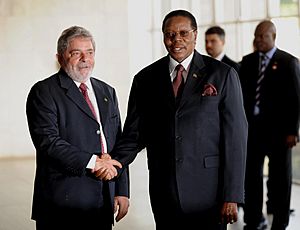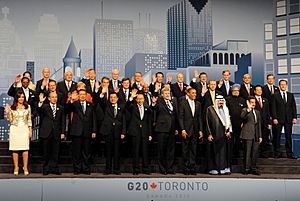Bingu wa Mutharika facts for kids
Quick facts for kids
Bingu wa Mutharika
|
|
|---|---|

Mutharika in 2009
|
|
| 3rd President of Malawi | |
| In office 24 May 2004 – 5 April 2012 |
|
| Vice President |
|
| Preceded by | Bakili Muluzi |
| Succeeded by | Joyce Banda |
| 8th Chairperson of the African Union | |
| In office 31 January 2010 – 31 January 2011 |
|
| Preceded by | Muammar Gaddafi |
| Succeeded by | Teodoro Obiang Nguema |
| Personal details | |
| Born |
Brightson Webster Ryson Thom
24 February 1934 Thyolo, Nyasaland |
| Died | 5 April 2012 (aged 78) Lilongwe, Malawi |
| Nationality | Malawian |
| Political party | DPP (2005–2012) |
| Other political affiliations |
UDF (1986–2005) |
| Spouses |
Ethel Mutharika
(m. 1984; died 2007)Callista Chimombo
(m. 2010) |
| Children | 4 |
| Relatives | Peter Mutharika (brother) |
| Alma mater | University of Delhi California Miramar University |
| Profession | Economist |
Bingu wa Mutharika (born Brightson Webster Ryson Thom; 24 February 1934 – 5 April 2012) was a Malawian politician and economist. He served as the President of Malawi from May 2004 until his death in April 2012. He was also the leader of the Democratic Progressive Party, which he started in 2005. This party won a majority in Malawi's parliament in the 2009 election. In 2010, he received the special title "Ngwazi" from a traditional chief, becoming the second Malawian president to get this honor.
During his time as president, he was known for leading the African Union from 2010 to 2011. He also focused on improving food security in Malawi. He passed away in office from a heart attack in 2012.
Contents
Early Life and Education
Bingu wa Mutharika was born Brightson Webster Ryson Thom on 24 February 1934. His birthplace was the village of Kamoto in Thyolo District, Malawi. His parents, Ryson Thom Mutharika and Eleni Thom Mutharika, were both involved with the Church of Scotland Mission. His father was a teacher for 37 years.
After finishing his primary school, Mutharika earned his Cambridge Overseas School Leaving Certificate in 1956. He then joined the civil service in Nyasaland (now Malawi). In 1964, he was one of 32 Malawians chosen to study in India. He earned a bachelor's degree in Economics from the Shri Ram College of Commerce in Delhi. Later, he got a master's degree in Economics from the Delhi School of Economics. He also earned a PhD in Development Economics. During the 1960s, he changed his name to Bingu wa Mutharika.
Mutharika worked in the civil service in Malawi and Zambia. He also worked for the World Bank as a Loans Officer. He served at the United Nations Economic Commission of Africa. He was also the Secretary General of the Common Market for Eastern and Southern Africa (COMESA). In 2002, he became Malawi's Minister of Economic Planning and Development.
Becoming President

Bingu wa Mutharika was chosen by the previous president, Bakili Muluzi, to be his successor. Mutharika won the presidential election on 20 May 2004. He became president a few days later.
In 2006, he announced he would run for re-election in 2009. His party, the Democratic Progressive Party, chose him as their candidate. He won the 2009 election with a large majority of the votes.
First Term (2004–2009)
During his first term, Malawi made great progress in farming. The country produced a lot of food and became food secure. President Mutharika started a program to help small farmers with subsidies. This program helped about 1.7 million farmers. In the 2005/2006 farming season, Malawi had a food surplus of over 500,000 metric tons. By 2008/2009, the surplus was even larger, at 1.3 million metric tons. This farming policy was very successful, though it was also costly.
Second Term (2009–2012)
During his second term, Mutharika continued to focus on economic improvements. He worked on fiscal responsibility and fighting corruption. His government's plan for 2006–2011 focused on several key areas. These included agriculture, education, transport, energy, and rural development.
By 2009, the number of Malawians living in poverty had dropped significantly. This was largely due to the successful agricultural policies. Mutharika also wanted to help other African nations achieve food security. As Chairman of the African Union, he proposed the "African Food Basket" plan. This plan aimed to help small farmers, especially women, with subsidies and better irrigation.
However, his second term also faced some challenges. He had disagreements with his vice-president, Joyce Banda. She was removed from the party in 2010, but she remained the country's vice-president. There were also protests in 2011 due to fuel shortages and rising prices.
Leading the African Union
On 31 January 2010, Mutharika became the chairman of the African Union. He was the first head of state from Malawi to hold this important position. In his speech, he said that Africa is not a poor continent, but its people are. He called for Africa to develop itself. He made food security a top goal during his time as chairman.
As chairman, he attended important international meetings. These included the 50th anniversary of Senegalese independence. He also went to the G8 summit in Canada and the G20 summit in Seoul, South Korea.
At an African Union summit in Uganda, he spoke about the International Criminal Court (ICC). He believed its actions against some African leaders could harm African authority. He also promoted the African Food Basket Initiative at the United Nations. Mutharika often argued that African governments should support their farmers, just as Western countries support theirs.
Family Life
Bingu wa Mutharika was born into the Presbyterian faith. He later became a Roman Catholic. He married Ethel Zvauya Mutharika, and they had four children. Ethel passed away in 2007. In 2010, Mutharika married Callista Chimombo, who was a former Minister of Tourism.
His brother, Peter Mutharika, was a university lecturer. He later became a member of the Malawian Parliament and held several cabinet positions. Peter Mutharika later became the 5th President of Malawi in 2014.
Death
Bingu wa Mutharika died on 5 April 2012, at the age of 78. He suffered a heart attack. He was flown to a hospital in South Africa for treatment. His death was officially confirmed on 7 April. On that day, Joyce Banda was sworn in as Malawi's first female president.
Many people remembered Mutharika for his dedication to helping the poor in Malawi. He was seen as a leader who worked hard to improve his country.
Awards and Recognition
Mutharika received many awards for his work. These include:
- The United Nations Special Millennium Development Goal Award (2010) for helping to end hunger in Malawi.
- COMESA Distinguished Award (2010) for his leadership and service to COMESA.
- Southern Africa Trust Drivers of Change Award (2009) for turning Malawi from a country that needed food aid to one that produced enough food for itself.
- 2009 Medal of Glory Awards for his reforms that helped Malawi's economy grow.
- The Most Excellent Grand Commander (MEGC), Malawi's highest national award (2009).
- FANRPAN Food Security Policy Leadership Award (2008) for his successful farming policies.
- FAO's Agricola Medal (2008) for his work in transforming Malawi's economy.
- Louise Blouin Foundation Award for Exceptional Creative Achievement (2008).
- Danish Government Award (2008) for promoting gender equality.
- The Order of Brilliant Jade with Gran Cordon from the President of the Republic of China (2005).
He also received several honorary degrees from universities around the world.
Mutharika founded several organizations. These include the Bineth Trust, which supports education, and the Bingu Silvergrey Foundation for the elderly. He also founded several universities in Malawi.
Images for kids
-
Luiz Inácio Lula da Silva (left) with Bingu wa Mutharika (right).
See also
 In Spanish: Bingu wa Mutharika para niños
In Spanish: Bingu wa Mutharika para niños
 | Frances Mary Albrier |
 | Whitney Young |
 | Muhammad Ali |





